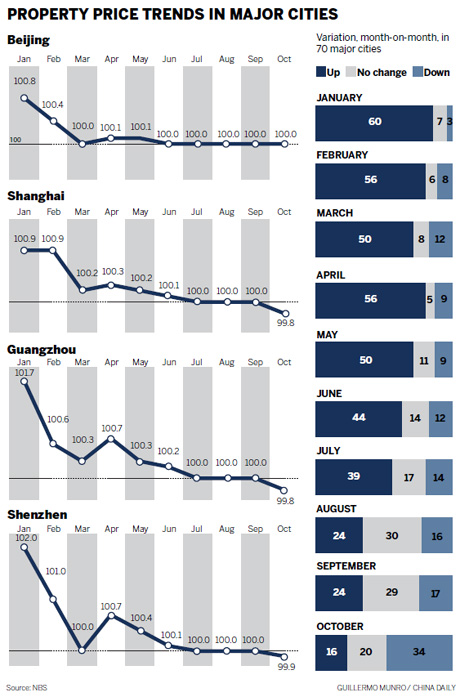Property prices in big cities heading south
Updated: 2011-11-19 12:52
By Hu Yuanyuan (China Daily)
|
|||||||||||
Nation sees cost of realty fall in October as tightening policy starts to bite
BEIJING - Nearly half of 70 major Chinese cities surveyed experienced a decline in the price of housing in October, the widest-spread decline in the country this year, as the government's continuous tightening measures took effect.
|
|
On a monthly basis, 34 of the statistical pool of 70 major cities saw new-home prices decline last month, up from 17 cities in September, according to the National Bureau of Statistics (NBS) on Friday.
In Shanghai, new-home prices fell 0.2 percent in October from the previous month, the first drop in 13 months. Wenzhou, a private business boomtown, posted the steepest decline with 4.6 per cent.
In October, two cities saw a year-on-year decline in new-home prices, compared with one in September, according to the NBS.
Although home prices have started to drop across the country, a deeper correction is expected in primary cities such as Beijing, Shanghai and Shenzhen, said Richard van den Berg, Greater China country manager at CBRE Global Investors.
"We expect the land price to fall by 30 percent on average, indicating 15 percent off the normal price of residential projects," Van den Berg said. "However, it is a healthy correction instead of a market crash."
In a recent research note, JP Morgan said that steeper declines may lie ahead, and prices nationally could fall by between 5 and 10 percent - or even as much as 20 percent in some major cities - over the next 12 to 18 months.
While noting the recent downward trend, Premier Wen Jiabao stated last month that the government will not loosen its property-tightening measures until home prices return to reasonable levels. That has triggered even wider and deeper price cuts by property developers.
China Vanke Co, the country's largest property developer by market value, is mulling a 20 percent price cut for its projects in Shanghai to stimulate sales, according to an unnamed source from the Shanghai-based brokerage Hanyu Property Consulting Co Ltd.
For Stephen Ip, infrastructure and real estate industry lead partner for KPMG China, property developers have found refinancing increasingly difficult, but a worse situation could develop if the tightening measures continue.
"Some property developers are facing a real risk of bankruptcy in the coming months, and more distress-caused mergers and acquisitions can be expected in 2012," said Ip.
Cheung Kong Holdings Ltd, the developer controlled by Hong Kong billionaire Li Ka-shing, is seeking acquisitions on the Chinese mainland as the liquidity crunch is making this a "golden time" for the company, according to Executive Director Justin Chiu at a forum in Hong Kong on Thursday.
However, concerns are also growing that a correction could undermine China's economic growth if it's too fast and deep.
In a recent report, the International Monetary Fund underscored concern that China's slowing growth and cooling property market may spark a rise in non-performing loans.
While a stress test of 17 major Chinese commercial banks showed they were resilient to isolated shocks - such as a real estate slump or a shift in short- versus long-term interest rates - a combination of simultaneous blows would leave the system "severely impacted", according to the report.
"It is probable that the country's macroeconomic policies will have to change in December, but that will not include the real estate policies," Zou Pingzuo, a researcher from the People's Bank of China, told a forum hosted by the Beijing Cankao newspaper on Wednesday.
Some foreign institutional investors, however, are forecasting a gradual loosening in real estate policies next year.
"With the ongoing market correction, stabilized inflation and the economic slowdown in Europe and the US next year, we are expecting China's tightening real estate policy to ease in the middle of 2012 or the end of next year," said Van den Berg.
The easing, however, will likely be a very gradual process, he added.
"I think the government should start to be cautious about property prices over-correcting on the downside, as it will inevitably affect the economy," said Wee Liat Lee, regional head of property at Samsung Securities (Asia).









